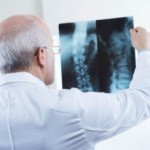Obesity, type 2 diabetes and insulin resistance raise bone-fracture risk
 Obesity and type 2 diabetes is associated with poorer bone health and increases the risk of bone fractures, according to new findings from the University of Missouri. The findings come from studies conducted on groups of rat. One group of rats was allowed to overeat and be active, the other group was also allowed to overeat but was sedentary, and the third group was the control, which ate normally but was sedentary.
Obesity and type 2 diabetes is associated with poorer bone health and increases the risk of bone fractures, according to new findings from the University of Missouri. The findings come from studies conducted on groups of rat. One group of rats was allowed to overeat and be active, the other group was also allowed to overeat but was sedentary, and the third group was the control, which ate normally but was sedentary.
Analysis revealed that the mice that overate but were allowed to be active had stronger bones and were less prone to insulin resistance. The group of mice that overate and were sedentary had poorer bone health. Lead author, Pam Hinton, Ph.D., explained, “As the rats continued to grow, all groups increased their bone mass, but the rats that were obese and sedentary didn’t accumulate as much bone mass relative to their body weight. So, decreased bone formation, loss of bone mass and decreased bone strength all were present in the obese, diabetic, sedentary rats. However, the rats that exercised did not lose bone strength. In fact, the rats that ran on the wheels had stronger bones than the normal-weight controls.”
The findings reveal the important role exercise plays, not only in reducing obesity and insulin resistance, but in building bone strength as well. To read more about the study, click HERE.
Obesity and fracture risk
 Previous research has shown a prevalence between obesity and rates of osteoporosis. Obese women were previously found to be protected against osteoporosis and bone fractures but newer findings suggest the opposite. In fact, numerous studies have shown that obesity is a risk factor for poor bone health.
Previous research has shown a prevalence between obesity and rates of osteoporosis. Obese women were previously found to be protected against osteoporosis and bone fractures but newer findings suggest the opposite. In fact, numerous studies have shown that obesity is a risk factor for poor bone health.
Excessive fat, especially abdominal fat, has been shown to produce inflammatory cytokines, which can stimulate bone resorption and thus reduce bone strength. Additional studies have shown that the relationship between bone fractures and obesity is dependent on other factors, such as ethnicity, gender and fat distribution.
The increase in bone fractures due to obesity has important health implications, so strategies need to be put forth to reduce the risk of fractures among obese individuals.
Related Reading: 7 Workouts for stronger, healthier bones
Previous study links insulin resistance to weaker bones
Insulin resistance and diabetes have been shown to contribute to weaker bones. Insulin’s normal function is to regulate sugar within the blood. With insulin resistance insulin does not work effectively, thus contributing to high levels of sugar in the blood.
If insulin resistance is not treated, it can contribute to other health implications, such as hypertension, obesity and metabolic syndromes, which increase the risk of heart disease and stroke.
Type 2 diabetes has also been linked with an increase in bone fractures, even though bone density tends to be higher among diabetics. In a clinical study researchers found bone strength was correlated with the level of insulin resistance. Their findings uncovered that bone strength decreased by 10 to 14 percent every time insulin resistance doubled.
Study lead author, Dr. Preethi Srikanthan from the University of California, Los Angeles, said, “This finding could have significant public health implications for the bone health of a large number of obese individuals, both those with and those without type 2 diabetes. Being obese not only increases your risk of being diabetic, but it also increases your risk for fragile bones.”
Losing weight for people with type 2 diabetes
It’s important that those with type 2 diabetes lose weight because being overweight can lead to further complications related to diabetes. Here are some tips that can help you lose weight if you are diabetic.
- Exercise regularly.
 Eat breakfast – skipping breakfast puts your body in starvation mode, which makes your body hold
Eat breakfast – skipping breakfast puts your body in starvation mode, which makes your body hold
on to fat.- Cut calories.
- Increase your fiber intake.
- Have smaller meals.
- Set goals for yourself.
- Get support from others.
- Use tricks to prevent overeating – have low-calorie foods first to fill up, eat salad dressing on the side, take up a hobby to stay occupied and do not snack.
Related Reading: Effective natural remedies, prevention, lifestyle changes and diet for diabetes
Maintain strong bones with diabetes
Diabetes can increase your risk of weaker bones, so it’s important to take the necessary steps to protect your bones and keep them strong. Effective ways to keep your bones strong with or without diabetes are to exercise with weight-bearing moves, consume calcium along with vitamin D to increase absorption, ensure you are receiving adequate amounts of vitamin K, and limit alcohol consumption along with not smoking.
If you’re really concerned about your bones, speak to your doctor as well as; they may be able to offer you specific medication in order to keep your bones strong.
- DON'T MISS
- Improving your Family’s Health for Life
- Whoever Said I Need Help Losing Weight?
- Is Phentermine For Everybody?
- Ultimate Weight Loss: 7 Simple Ways to Eat Better
- Weight Loss for Good: The Cold Hard Truth!
- How To Drop Weight and Become Healthier Using These 7 Simple Everyday Life Tips?
- Rating The Diets: A Mindless Exercise?
- Losing Weight is All About Counting Calories/Carbs and Exercising. Or Is It?
- Free Diet Plans – How can you Find the Best One?
- The One and Only Way to Lose Weight




